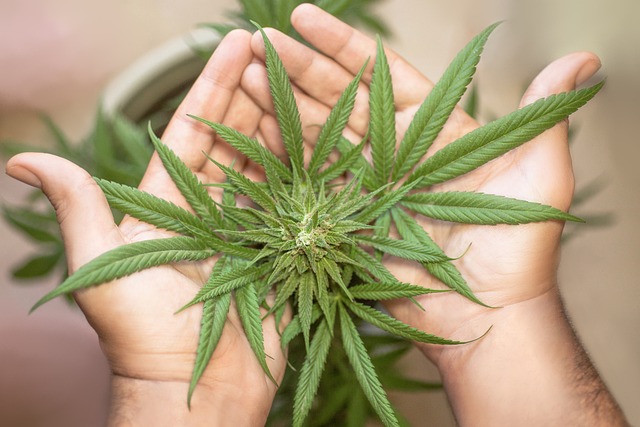In Colorado, where cannabis legislation is progressive, THCA (Tetrahydrocannabinolic Acid), a non-psychoactive compound found in the Cannabis sativa plant and legal in Colorado, has become a focus for its potential health benefits. As a precursor to THC, THCA is available in hemp flowers within the state's regulated market, offering anti-inflammatory and neuroprotective effects that may aid in pain management, anxiety reduction, and improved sleep without causing psychoactive effects. Colorado's regulations ensure the safe and legal cultivation, processing, and sale of THCA products, differentiating them from their psychoactive counterpart. Users should be aware that THCA can convert into THC when heated and that it can still have side effects like dizziness or anxiety at higher doses. The state's comprehensive guidelines promote informed use and responsible dosing to maximize benefits while minimizing potential adverse effects, making THCA a significant component of Colorado's cannabis landscape.
Exploring the intricacies of THCA flower’s impact on health, particularly within the regulated environment of Colorado, this article sheds light on the legal status of THCA in Colorado and its associated side effects. As interest in cannabinoids grows, understanding their effects becomes paramount for safe and informed usage. This piece delves into consumer considerations, ensuring readers are well-equipped with knowledge to navigate the legal landscape of THCA’s usage in Colorado.
- Exploring the Impact of THCA Flower on Health: A Focus on Legal Usage in Colorado
- THCA Flower Side Effects and Consumer Considerations within the Regulated Environment of Colorado
Exploring the Impact of THCA Flower on Health: A Focus on Legal Usage in Colorado

THCA, or Tetrahydrocannabinolic Acid, is a non-psychoactive cannabinoid found in the Cannabis sativa plant that proponents suggest could offer therapeutic benefits. As of recent legal updates, THCA-rich hemp flowers have become a focus of interest for those seeking wellness and health improvements legally within Colorado’s regulated market. The state of Colorado has established clear guidelines for the cultivation, processing, and consumption of cannabis products, including THCA flower, which is distinct from its psychoactive counterpart, THC.
In Colorado, where cannabis laws are among the most progressive in the United States, THCA flower is being explored for its potential health benefits within a legal framework. Users often consume THCA flower for its reported anti-inflammatory and neuroprotective properties, which could be beneficial for managing pain, reducing anxiety, and improving sleep quality. The legal status of THCA in Colorado allows researchers and consumers to study and utilize its effects without the psychoactive impact associated with THC. This has led to a growing body of anecdotal evidence and scientific research that continues to shed light on the therapeutic potential of THCA, contributing valuable insights into its role in health and wellness.
THCA Flower Side Effects and Consumer Considerations within the Regulated Environment of Colorado

In the regulated environment of Colorado, THCA flower has emerged as a topic of interest among consumers intrigued by its potential therapeutic benefits and unique chemical makeup. As THCA, or tetrahydrocannabinolic acid, is the precursor to THC, the psychoactive component in cannabis, it’s important for consumers to be aware of both the legal status and the side effects associated with its consumption. In Colorado, where recreational cannabis use is legally sanctioned, THCA is a prominent figure in dispensaries due to its non-psychoactive state at lower temperatures and its conversion into THC when heated or decarboxylated. Consumers must consider the legal distinctions between THC and THCA products within this context, as they can differ significantly in their effects and legal compliance. Side effects of THCA flower consumption, though less psychoactive than its derivative THC, can still include dizziness, paranoia, or anxiety in sensitive individuals. Additionally, consumers should be mindful of the dosage, as overconsumption can lead to adverse reactions. The state’s stringent regulations ensure that THCA products are tested for purity and potency, providing a level of safety for consumers. However, individual experiences with THCA flower may vary, and it is always recommended that new users start with small doses to gauge their body’s response. In Colorado, where the cannabis industry is well-regulated and transparent, THCA legal status facilitates consumer access while emphasizing the importance of informed decision-making and adherence to dosage guidelines to mitigate any potential side effects.
In conclusion, the emergence of THCA flower as a legal substance in Colorado has opened new avenues for consumer exploration within a regulated environment. While its potential health benefits are subject to ongoing research, it is clear that users must be well-informed about the side effects associated with its use. As highlighted throughout this article, understanding the nuances of THCA flower consumption and its impact on individual health requires careful consideration. Consumers in Colorado are encouraged to approach THCA legal usage with caution and adhere to dosage guidelines provided by healthcare professionals or state regulations. By doing so, they can navigate the benefits and risks associated with this cannabinoid effectively, ensuring a safer experience in line with the state’s progressive stance on cannabis.
